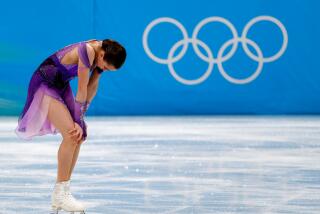Gaines Is Said to Be on List
- Share via
Three U.S. track and field champions tested positive for the stimulant modafinil over the summer, among them sprinter and Olympic gold medalist Chryste Gaines, sources familiar with the inquiry into stimulants and a newly detected “designer steroid” said Monday.
Those testing positive after the U.S. Anti-Doping Agency reviewed results from samples taken at the U.S. outdoor track championships this June at Stanford, include Gaines, who won gold in the women’s 400 relay at the 1996 Summer Games in Atlanta; Sandra Glover, a four-time U.S. champion in the women’s 400 hurdles who was second at the world track championships in August at Paris, and Eric Thomas, 2003 U.S. outdoor 400 hurdles champion.
At least half a dozen U.S. athletes are believed to have tested positive for the same stimulant. Calvin Harrison, a gold medalist at the 2000 Olympic Games in the 1,600 relay, has acknowledged a positive test. Doctors use modafinil to treat narcolepsy, a sleeping disorder, and it is not clear why there was a surge in use of the substance by athletes.
Naming of U.S. athletes with positive tests was triggered by the disclosure two weeks ago of what USADA indicated was widespread use of the stimulant as well as the designer steroid, tetrahydrogestrinone, or THG. USADA’s chief executive, Terry Madden, has said THG was identified after an anonymous tip from a self-described “high profile” track coach.
USADA has tied the discovery and distribution of THG to Bay Area Laboratory Co-Operative (BALCO), of Burlingame, Calif. BALCO is the focus of a grand jury now sitting in San Francisco. The company’s founder, Victor Conte, is widely known in track circles. He has denied wrongdoing.
Another figure drawing considerable interest is track coach Remi Korchemny, now living in the Bay Area. A generation ago, Korchemny helped train Soviet sprint star Valeri Borzov, an Olympic gold medalist. Korchemny has said he had never heard of BALCO until one of his runners, Gaines, worked out with NFL standout Bill Romanowski, an Oakland Raider linebacker who then played for the Denver Broncos.
Korchemny did not return a phone call Monday to his home.
Forty athletes have been subpoenaed to testify before the grand jury, according to Conte. CBS Sports reported Sunday that seven current or former Raiders, including Romanowski, are on the list.
Others are Barry Bonds of the San Francisco Giants and Jason Giambi of the New York Yankees, boxer Shane Mosley and track standouts Kelli White, a sprinter, and Kevin Toth, a shotputter.
The scope of the federal inquiry has not been announced. A subpoena is merely a legal request for testimony or information and does not indicate misconduct.
White tested positive at the world track championships in Paris for modafinil. So did hurdler Chris Phillips. White won the women’s 100- and 200-meter sprints. Phillips finished sixth in the men’s 110-meter hurdles.
Modafinil is a stimulant. THG is a steroid. Both stimulants and steroids have long histories in track and field. Steroids build muscles and enable an athlete to train harder and longer. Stimulants energize. Some within track and field, however, have come to believe that a particular stimulant can “mask,” or hide, steroid use, and the connection, if any, between modafinil and THG is not known.
At least one internationally recognized expert on the use of drugs in sport, Long Island internist Gary Wadler, said that such a connection would seem to make little sense.
The performance-enhancing effects of THG, according to USADA, can last for months. But it is detectable in the body for only a few days after ingestion. For an athlete following a carefully planned ingestion schedule, THG would thus be all but “invisible to detection,” Wadler said, adding, “So why would you take something to make something [supposed to be] invisible, invisible?”
Four U.S. track performers and Europe’s fastest sprinter, Britain’s Dwain Chambers, are believed to have tested positive for THG. News accounts have identified three of the four Americans -- distance standout Regina Jacobs, hammer thrower John McEwen and Toth. Jacobs was identified by the Washington Post; McEwen by the Chicago Tribune; Toth by the Post and the Cleveland Plain Dealer.
Chambers’ lawyer issued a statement last week acknowledging that the sprinter had tested positive for THG. None of the three Americans has acknowledged a positive test.
“She doesn’t know what THG is,” Jacobs’ attorney, New York lawyer Ed Williams, said.
Gaines, reached on her mobile phone, was asked if she’d been notified of a positive modafinil test.
“I haven’t gotten anything,” she said, then ended the call and did not return another call seeking further comment. Her agent, Renaldo Nehemiah, did not return calls to his office.
Glover did not return a call to her mobile phone.
Thomas’ agent, Caroline Feith, reached on her mobile phone in the Netherlands, said, “I haven’t gotten any official documentation. Until then, I can’t say anything.”
All tests must yet be confirmed by further laboratory analysis, and a sometimes-lengthy hearing and appeals process must run its course before sports authorities confirm a sanction, if any, against a particular athlete.
More to Read
Go beyond the scoreboard
Get the latest on L.A.'s teams in the daily Sports Report newsletter.
You may occasionally receive promotional content from the Los Angeles Times.






